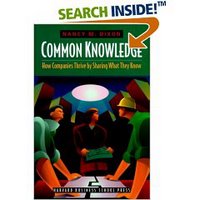
I went to the local library because they had purchased their first book on weblogs (apparently Rosmalen is about to enter blogosphere). But someone had borrowed it already and I bumped into Nancy Dixon's book on 'Kennisoverdracht in organisaties'. In english: Common knowledge: how companies thrive by sharing what they know. I had read her book on the organizational learning cycle, but this one was quite different.
Personally I had abandoned the term 'knowledge transfer' because I thought it's impossible to transfer knowledge. Rather people should take their own learning trajectories in hand. But after reading this book, I see it can be possible under some conditions. (still I feel the term knowledge transfer implies an easiness in handing over knowledge which is misleading)
She first does away with three mythes about knowledge transfer:
1. Build the system, people will come
2. Technology can replace human contact
3. First you have to create a learning culture
(must admit I was not sure that the third one is a myth, but I'm happy it is..). It's easier to build on what exists rather than changing the culture by introducing something new. She distinguishes 5 categories of transfer (very useful to make a distinction, I have the feeling often all kinds of knowledge are heaped in a single discussion on knowledge management):
1. Serial transfer (the same team executing a task in a new context)
2. Near transfer (transfer from a source team to a receiving team with a similiar task in a similar context)
3. Far transfer (transfer from a source team to a receiver team with a non-routine task, implicit knowledge)
4. Strategic transfer (transfer of complex knowledge from one team to the other, separated in place and time, the task is of strategic interest to the organisation)
5. Specialist transfer (transfer of explicit knowledge about a task not performed on a regular basis) This is a typical case where a listserve may work.
(just realize I don't know which english terms she uses as I read the Dutch translation, near and far transfer sounds weird). Other things which were striking:
* The fact that elements of a new situation can trigger people's implicit memory, so that old experiences bubble up.
* The reason to name a certain scattered, existing knowledge practice is to make is a legitimate activity, which makes a request for support no longer a favour from your colleague but a recognised part of your professional practice.
* Putting all implicit knowledge on paper on in text is very hard. Because implicit knowledge does not only exist by facts but also of the linkages between facts and how people link facts to deal with a certain situation. So gains from implicit knowledge can be found in situations where new things have to be designed or thought through. (this last one helps me to specify my question on virtual communities of practice, I still wonder how they will deal with transferring some of the deeper levels of implicit knowledge of the members, which can only be observed through reacting to certain situations).

No comments:
Post a Comment